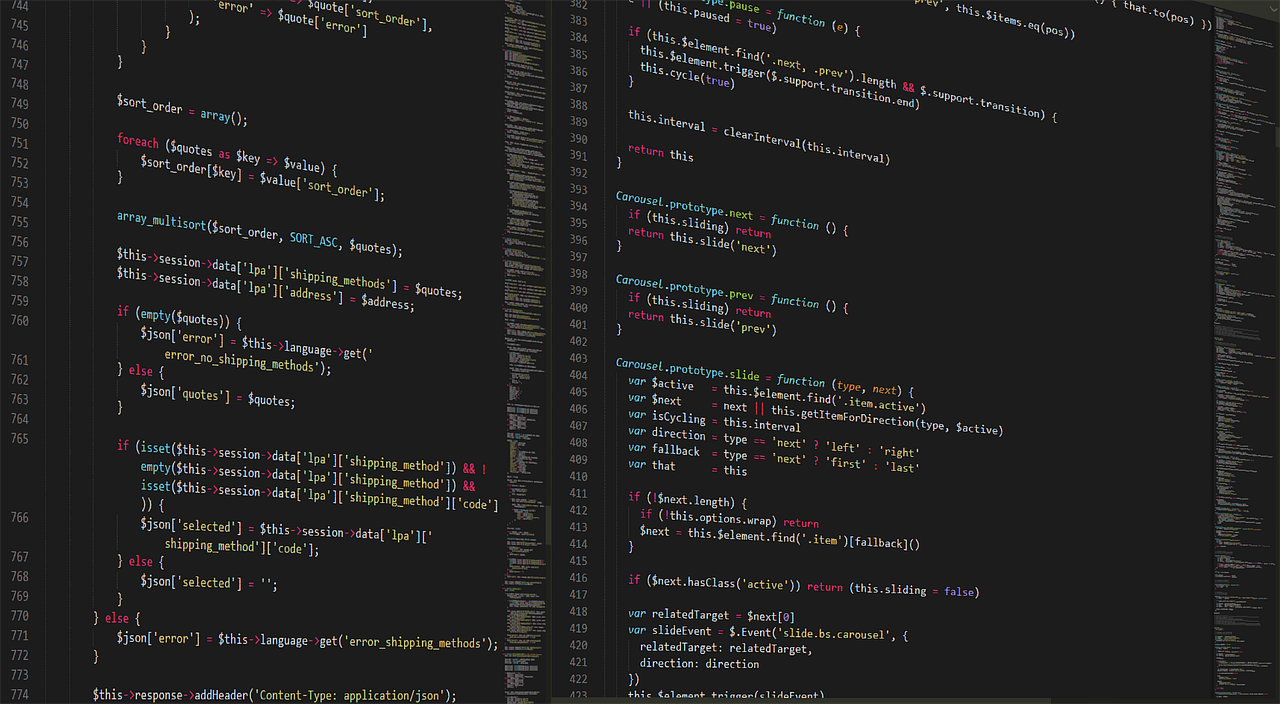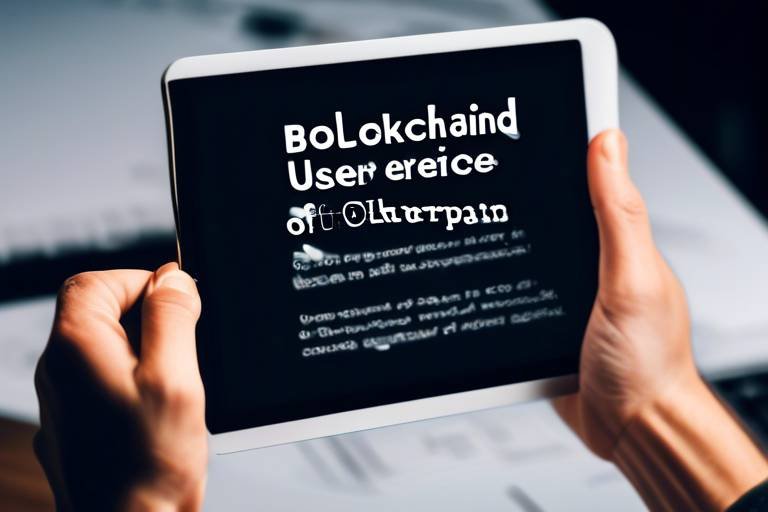The Role of Blockchain in Revolutionizing Personal Finance
Blockchain technology is not just a buzzword; it's a groundbreaking innovation that's reshaping the landscape of personal finance. Imagine a world where your financial transactions are not only secure but also transparent, efficient, and accessible to everyone. This is the promise of blockchain—a digital ledger that records transactions in a decentralized manner, ensuring that no single entity has control over your financial data. As individuals and businesses alike begin to embrace this technology, the implications for personal finance are profound and far-reaching.
At its core, blockchain operates as a distributed ledger, which means that every transaction is recorded across multiple computers rather than being stored in a single, centralized location. This decentralization ensures that the data is not only secure but also resistant to manipulation. Think of it like a digital fortress, where every brick is reinforced by cryptographic security measures. This level of security is crucial in today's world, where financial fraud and data breaches are all too common.
Moreover, the efficiency of blockchain technology can lead to significant cost savings. Traditional financial systems often involve multiple intermediaries, each taking a cut of the transaction fees. With blockchain, these middlemen are eliminated, allowing for faster and cheaper transactions. Imagine sending money to a friend on the other side of the world without the exorbitant fees that banks typically charge—this is the reality that blockchain can create.
But the benefits of blockchain extend beyond just cost and efficiency. One of the most exciting aspects of this technology is its potential to promote financial inclusion. According to recent studies, there are still billions of people around the globe who lack access to basic banking services. Blockchain can bridge this gap by providing an accessible platform for financial transactions, enabling individuals in underserved communities to participate in the global economy. This is not just a technological shift; it’s a societal transformation.
As we delve deeper into the role of blockchain in personal finance, it becomes clear that the implications are not just theoretical. Real-world applications are emerging that showcase the transformative power of this technology. From cryptocurrencies that allow individuals to invest and trade without traditional banks to decentralized finance (DeFi) platforms that offer innovative financial services, the future of personal finance is being rewritten before our eyes.
In conclusion, blockchain technology is revolutionizing personal finance by enhancing security, transparency, and efficiency in financial transactions. As we continue to explore this exciting frontier, it’s essential to stay informed and engaged with the developments in this space. The potential for change is immense, and those who embrace it stand to benefit the most. So, are you ready to take the leap into the world of blockchain and redefine your financial future?
- What is blockchain technology? Blockchain is a decentralized digital ledger that records transactions across multiple computers, ensuring security and transparency.
- How does blockchain enhance security in personal finance? By using cryptographic security measures and consensus mechanisms, blockchain protects financial data from fraud and unauthorized access.
- What are smart contracts? Smart contracts are self-executing contracts with the terms of the agreement directly written into code, allowing for automated transactions without manual intervention.
- What are the challenges of implementing blockchain in personal finance? Challenges include regulatory hurdles, scalability issues, and the need for user education to understand and adopt the technology.
- How is blockchain being used in decentralized finance (DeFi)? DeFi platforms use blockchain to offer services like lending, borrowing, and earning interest without the need for traditional banks.

Understanding Blockchain Technology
Blockchain technology is often described as the backbone of the digital currency revolution, and for good reason. At its core, blockchain is a decentralized digital ledger that records transactions across multiple computers. This means that no single entity has control over the entire chain, which inherently increases security and trust among users. Imagine a book that everyone can read and write in, but no one can erase or alter the pages. That’s the essence of how blockchain operates—once a transaction is recorded, it is nearly impossible to change, creating a permanent and transparent history of all activities.
One of the most significant features of blockchain is its cryptographic security. Each transaction is secured using complex algorithms, making it extremely difficult for hackers to manipulate the data. This cryptographic layer ensures that only authorized users can access and modify the information, effectively safeguarding financial data from fraud and unauthorized access. Furthermore, the decentralized nature of blockchain means that there’s no single point of failure; if one node goes down, the rest of the network continues to function seamlessly.
To better understand blockchain, let's break down its key components:
- Blocks: Each block contains a list of transactions. Once filled, it is sealed and linked to the previous block, forming a chain.
- Nodes: These are the computers that participate in the blockchain network. Each node has a copy of the entire blockchain, ensuring redundancy and security.
- Consensus Mechanisms: These are protocols that ensure all nodes agree on the validity of transactions. Popular methods include Proof of Work (PoW) and Proof of Stake (PoS).
By utilizing these components, blockchain technology creates a system that is not only secure but also efficient. Transactions can be processed faster than traditional banking methods, and with lower fees. This is particularly crucial in a world where speed and cost-effectiveness are paramount. Picture a busy highway with no traffic lights; blockchain allows for smooth and rapid transactions, bypassing the bottlenecks often associated with traditional financial systems.
In summary, understanding blockchain technology is essential for comprehending its transformative potential in personal finance. Its decentralized nature, cryptographic security, and efficient transaction processing are just a few reasons why it is poised to revolutionize how we manage our finances. As we delve deeper into its benefits and applications, it becomes clear that blockchain is not just a trend—it's a fundamental shift in the way we think about money and trust in financial transactions.

Benefits of Blockchain in Personal Finance
In recent years, blockchain technology has emerged as a game-changer in the realm of personal finance, offering a plethora of benefits that can significantly enhance how individuals manage their financial lives. One of the most compelling advantages is the reduction in transaction costs. Traditional financial systems often involve multiple intermediaries, each taking a cut of your hard-earned money. With blockchain, transactions can occur directly between parties, minimizing fees and making financial transactions more affordable.
Moreover, the enhanced security features of blockchain cannot be overstated. With its robust cryptographic techniques, blockchain ensures that financial data is not only secure but also resistant to fraud and unauthorized access. Imagine having a digital vault that is virtually impenetrable; that’s what blockchain offers. Transactions are recorded in a way that they cannot be altered or deleted, creating a level of trust that is hard to achieve with traditional systems.
Transparency is another key benefit of blockchain in personal finance. Every transaction is recorded on a public ledger that is accessible to all participants in the network. This means that anyone can verify transactions without needing to rely on a central authority. Such transparency can lead to increased confidence among users, as they can independently confirm that their transactions are legitimate. This feature is particularly beneficial in combating fraud and ensuring that financial practices are ethical.
Additionally, blockchain technology holds the potential for financial inclusion for unbanked populations. In many parts of the world, individuals lack access to traditional banking services, which can limit their economic opportunities. Blockchain can bridge this gap by providing a decentralized financial infrastructure that allows anyone with internet access to participate in the global economy. This could transform lives by enabling individuals to save, invest, and transact without needing a bank account.
To summarize, the benefits of blockchain in personal finance include:
- Reduced Transaction Costs: Direct transactions eliminate intermediary fees.
- Enhanced Security: Robust encryption protects financial data.
- Increased Transparency: Public ledger allows for independent verification of transactions.
- Financial Inclusion: Access to financial services for unbanked populations.
These advantages not only empower individuals but also create a more efficient and trustworthy financial ecosystem. As we delve deeper into the world of blockchain, it becomes increasingly clear that this technology is not just a passing trend; it is a fundamental shift in how we think about and manage our personal finances.
What is blockchain technology?
Blockchain is a decentralized digital ledger that records transactions across multiple computers, ensuring that the data is secure, transparent, and immutable.
How does blockchain enhance security in personal finance?
Blockchain uses cryptographic techniques to secure financial data, making it resistant to fraud and unauthorized access. Each transaction is recorded in a way that cannot be altered.
Can blockchain help unbanked individuals?
Yes! Blockchain can provide access to financial services for unbanked populations by allowing them to transact and manage their finances without needing a traditional bank account.
What are smart contracts?
Smart contracts are self-executing contracts with the terms of the agreement directly written into code. They automate and enforce agreements without the need for intermediaries.
Are there any risks associated with using blockchain in personal finance?
While blockchain offers numerous benefits, there are also challenges such as regulatory hurdles, scalability issues, and the need for user education to navigate this new technology effectively.

Enhanced Security Features
When it comes to personal finance, the word security carries immense weight. Imagine your financial data as a treasure chest filled with valuable assets; you wouldn’t want just anyone to have access to it. This is where blockchain technology shines, offering a fortress of security that traditional systems simply can't match. With its encryption and consensus mechanisms, blockchain acts as a digital vault, safeguarding your financial information from fraud and unauthorized access.
At its core, blockchain employs cryptographic techniques that ensure each transaction is secure and verifiable. Every time a transaction occurs, it gets bundled into a block, which is then added to a chain of previous transactions. This process creates a permanent and immutable record that can't be altered without consensus from the network. Think of it as a digital fingerprint—unique and unchangeable. This level of security is crucial in a world where data breaches and cyberattacks are rampant.
Moreover, the decentralized nature of blockchain means that there is no single point of failure. In traditional banking, a central server holds all the data, making it a tempting target for hackers. However, with blockchain, data is distributed across a network of computers, making it incredibly difficult for malicious actors to compromise the entire system. Each participant in the network has a copy of the entire ledger, ensuring that even if one node is attacked, the rest remain secure.
To illustrate the security benefits of blockchain, consider the following key features:
- Encryption: Every transaction is encrypted, protecting sensitive information from prying eyes.
- Consensus Mechanisms: Transactions are validated by the network, ensuring that only legitimate transactions are recorded.
- Immutability: Once a transaction is added to the blockchain, it cannot be altered or deleted, providing a permanent record.
- Decentralization: No single entity controls the blockchain, reducing the risk of fraud and manipulation.
In addition to these features, blockchain also enhances security through the use of smart contracts. These self-executing contracts automatically enforce and execute terms of an agreement based on predefined conditions. This means that once the conditions are met, the contract executes without the need for human intervention. Imagine setting up a financial agreement that automatically pays out when certain criteria are met—this not only saves time but also reduces the chances of human error or fraud.
In conclusion, the enhanced security features of blockchain technology are transforming personal finance by providing a safer and more reliable way to manage financial transactions. With its robust encryption, decentralized structure, and innovative smart contracts, blockchain is paving the way for a future where individuals can confidently engage in financial activities without the fear of security breaches. As we continue to embrace this technology, it’s clear that the financial landscape is evolving, and with it, our approach to security in personal finance.
Q: What makes blockchain more secure than traditional banking systems?
A: Blockchain's decentralized nature means there is no single point of failure, and its cryptographic security ensures that transactions are encrypted and immutable.
Q: How do smart contracts enhance security?
A: Smart contracts automatically execute agreements based on predefined conditions, reducing the risk of human error and fraud.
Q: Can blockchain technology prevent fraud?
A: Yes, the consensus mechanisms and immutability of blockchain records make it extremely difficult for fraudulent activities to occur.

Decentralization and Trust
When we think about traditional financial systems, one of the biggest challenges is the reliance on intermediaries—banks, brokers, and payment processors. These entities hold power and control over our transactions, which can lead to inefficiencies, higher costs, and, more importantly, trust issues. Enter decentralization, a core principle of blockchain technology that flips this script on its head. Instead of relying on a single entity to facilitate trust, blockchain allows for a network of participants to verify transactions collectively, creating a system that is inherently more transparent and trustworthy.
Imagine a world where your financial transactions don’t require a middleman. With blockchain, every transaction is recorded on a public ledger, visible to all participants in the network. This means that once a transaction is made, it cannot be altered or deleted, providing an immutable record of all financial activities. This transparency is revolutionary; it eliminates the need for trust in a single institution because the trust is distributed among all network participants. In essence, the blockchain acts as a digital notary, ensuring that all parties can independently verify the authenticity of transactions.
Furthermore, decentralization fosters a sense of community among users. In a typical banking scenario, you may feel like just another number in a vast system. However, on a blockchain network, you become an integral part of a community that values transparency and collective responsibility. This shift not only enhances trust but also empowers individuals, giving them more control over their financial assets. Think of it as a neighborhood watch for your finances—everyone is looking out for one another, ensuring that no one can tamper with the records.
But how does this decentralization work in practice? Here’s a quick breakdown:
- Consensus Mechanisms: Blockchain networks utilize various consensus algorithms, such as Proof of Work or Proof of Stake, to validate transactions. This means that no single entity can dictate the rules or manipulate the system for personal gain.
- Transparency: All transactions are visible on a public ledger, allowing anyone to audit the history of transactions, which builds confidence in the system.
- Participation: Every user in the network can participate in the validation process, ensuring that the system remains democratic and fair.
While decentralization brings many benefits, it’s crucial to acknowledge that it also comes with its own set of challenges. Users must be educated about how to navigate this new landscape, and there is still a need for regulatory frameworks to ensure that the system remains fair and secure. Nonetheless, the potential for increased trust and empowerment through decentralization is immense, paving the way for a new era in personal finance.
- What is decentralization in blockchain? Decentralization refers to the distribution of control and authority away from a central entity, allowing multiple participants in a network to verify and validate transactions.
- How does decentralization enhance trust? By removing intermediaries and providing a transparent, immutable record of transactions, decentralization allows users to independently verify the authenticity of their financial activities.
- What are the challenges of decentralization? Challenges include the need for user education, potential regulatory hurdles, and ensuring that all participants in the network act honestly and responsibly.

Smart Contracts and Automation
Imagine a world where financial agreements are executed flawlessly, without the need for a middleman. This is the promise of smart contracts, a revolutionary feature of blockchain technology that automates and streamlines financial transactions. But what exactly are smart contracts? In simple terms, they are self-executing contracts with the terms of the agreement directly written into code. These contracts run on the blockchain, which means they are immutable and transparent, ensuring that all parties involved can trust the process.
One of the most significant advantages of smart contracts is their ability to reduce human error and increase efficiency. Traditional contracts often require extensive paperwork and manual processing, which can lead to delays and misunderstandings. With smart contracts, once the predefined conditions are met, the contract executes automatically. This eliminates the need for intermediaries, such as lawyers or banks, which not only saves time but also reduces costs. For instance, in a real estate transaction, a smart contract could automatically transfer ownership of a property once payment is confirmed, without the need for a lengthy escrow process.
Furthermore, smart contracts can be programmed to handle complex transactions involving multiple parties. Consider a scenario where a group of friends wants to pool their money for a vacation. A smart contract can be set up to automatically collect contributions, release funds to book accommodations once the total amount is reached, and even manage refunds if plans change. This level of automation not only simplifies the process but also enhances trust among participants, as everyone can see the transaction history on the blockchain.
However, while the potential of smart contracts is immense, it’s essential to recognize that they are not without challenges. For instance, the code must be written accurately to avoid vulnerabilities that could be exploited. Additionally, legal recognition of smart contracts is still evolving, which means that in some jurisdictions, they may not hold the same weight as traditional contracts. Therefore, while smart contracts offer exciting opportunities for automation in personal finance, it’s crucial for users to approach them with a clear understanding of the risks involved.
In conclusion, smart contracts represent a significant leap forward in automating financial transactions. They not only enhance efficiency and reduce costs but also foster trust among parties by providing a transparent and secure framework for executing agreements. As more individuals and businesses begin to embrace this technology, we can expect to see a transformation in how financial agreements are made and managed.
- What are smart contracts? Smart contracts are self-executing contracts with the terms directly written into code, running on a blockchain.
- How do smart contracts enhance efficiency? They automate the execution of agreements, eliminating the need for intermediaries and reducing the risk of human error.
- Are smart contracts legally binding? The legal recognition of smart contracts varies by jurisdiction and is still evolving.
- What are the risks associated with smart contracts? Potential risks include coding errors, security vulnerabilities, and lack of legal recognition in some areas.

Challenges and Limitations
While blockchain technology holds immense potential to revolutionize personal finance, it's not without its . One of the most significant hurdles is the regulatory landscape. Governments around the world are still grappling with how to classify and regulate blockchain-based assets and transactions. This uncertainty can create a stumbling block for individuals and businesses looking to adopt blockchain solutions. Without clear regulations, users may be hesitant to engage with blockchain technologies, fearing potential legal repercussions or sudden shifts in policy.
Another challenge is scalability. As more users join blockchain networks, the demand for processing transactions increases. Current blockchain systems, like Bitcoin and Ethereum, can experience slow transaction speeds and high fees during peak usage times. This can be frustrating for users who expect the same efficiency they experience with traditional financial systems. Imagine trying to send money to a friend, only to be told that you’ll have to wait because the network is congested. It's a bit like being stuck in traffic when you just want to get to your destination!
Moreover, there’s the issue of user education. Many people still have a limited understanding of blockchain technology, which can lead to skepticism and reluctance to adopt it. For blockchain to reach its full potential in personal finance, users need to comprehend how it works and its benefits. This requires substantial educational efforts from both the industry and educational institutions. Without this knowledge, many may miss out on the advantages that blockchain can offer.
Additionally, the technology is still in its infancy, which means that it can be prone to bugs and vulnerabilities. Just like any new technology, blockchain systems can be susceptible to hacks and security breaches, which can undermine trust. Users need to be aware of these risks and take necessary precautions, such as using secure wallets and following best practices for online security.
In summary, while blockchain has the potential to transform personal finance, it faces several challenges, including:
- Regulatory uncertainty
- Scalability issues
- User education and awareness
- Technical vulnerabilities
Addressing these challenges is crucial for the widespread adoption of blockchain technology in personal finance. As the industry evolves, solutions will likely emerge to mitigate these issues, paving the way for a more secure and efficient financial landscape.
- What is blockchain technology?
Blockchain is a decentralized digital ledger that records transactions across multiple computers securely and transparently. - How does blockchain enhance security in personal finance?
Blockchain uses cryptographic techniques and consensus mechanisms to protect data from fraud and unauthorized access. - What are smart contracts?
Smart contracts are self-executing contracts with the terms of the agreement directly written into code, allowing for automation of transactions. - What are the risks associated with cryptocurrencies?
Cryptocurrencies can be volatile, and users may face risks such as hacking, regulatory changes, and market fluctuations.

Real-World Applications of Blockchain
Blockchain technology is not just a buzzword; it's a revolutionary force that's reshaping the landscape of personal finance in ways we never thought possible. Imagine a world where financial transactions are seamless, secure, and transparent. This is the promise of blockchain, and it’s already being realized through various real-world applications that are making waves across the globe.
One of the most prominent applications of blockchain in personal finance is the rise of cryptocurrencies. These digital currencies operate on decentralized networks, allowing users to send and receive money without the need for traditional banking systems. Think of it as a digital version of cash that you can carry around in your smartphone. With cryptocurrencies like Bitcoin and Ethereum gaining traction, more people are investing in these assets, hoping to ride the wave of their increasing value. But with great opportunity comes great risk; the volatility of these currencies can lead to significant gains or losses in a very short period.
Another exciting application is the emergence of peer-to-peer lending platforms. These platforms leverage blockchain to connect borrowers directly with lenders, eliminating the need for a middleman. This not only reduces costs but also enhances the speed of transactions. Imagine needing a loan for a personal project and being able to secure funds from an individual rather than a bank, often with lower interest rates and less stringent requirements. It’s like borrowing from a friend, but on a much larger scale and with the security of blockchain backing the transaction.
Furthermore, the world of Decentralized Finance (DeFi) is taking personal finance to another level. DeFi platforms offer a range of financial services that operate independently of traditional banks. Users can lend, borrow, and earn interest on their assets without ever stepping foot in a bank. This democratization of finance is particularly beneficial for those who are unbanked or underbanked, providing them with access to financial services that were previously out of reach. In essence, DeFi is like having a bank in your pocket, accessible to anyone with an internet connection.
To illustrate the impact of these applications, let’s take a look at some key statistics:
| Application | Description | Impact |
|---|---|---|
| Cryptocurrencies | Digital currencies that operate on a decentralized network. | Increased accessibility to investment opportunities. |
| Peer-to-Peer Lending | Platforms that connect borrowers with individual lenders. | Reduction in borrowing costs and faster loan approvals. |
| Decentralized Finance (DeFi) | Financial services that operate without traditional banks. | Greater financial inclusion and access to services. |
As we can see, the real-world applications of blockchain are not just theoretical; they are actively transforming how we manage our finances. With each passing day, more individuals and businesses are embracing these innovations, paving the way for a future where financial transactions are not only more efficient but also more secure and inclusive.
- What is blockchain technology? Blockchain is a decentralized digital ledger that records transactions across multiple computers in a way that the registered transactions cannot be altered retroactively.
- How does blockchain enhance security? Blockchain utilizes cryptographic techniques and consensus mechanisms to secure data, making it highly resistant to fraud and unauthorized access.
- Can anyone use cryptocurrencies? Yes, anyone with internet access can buy, sell, or trade cryptocurrencies, making them accessible to a global audience.
- What are the risks associated with DeFi? While DeFi offers many benefits, it also comes with risks such as smart contract vulnerabilities and market volatility.

Cryptocurrencies and Investment
When it comes to personal finance, cryptocurrencies have emerged as a groundbreaking force, reshaping how individuals think about investing. Imagine a world where your money is not just sitting in a bank account, but actively working for you, growing in value, and offering you unprecedented control over your assets. That's the allure of cryptocurrencies! They represent a new frontier in investing, where traditional barriers are dismantled and the potential for profit is only limited by your own understanding of the market.
But, let's be real for a moment. While the idea of investing in digital currencies like Bitcoin or Ethereum sounds enticing, it comes with its own set of challenges and risks. The volatility of cryptocurrencies can make your head spin; prices can skyrocket one day and plummet the next. This rollercoaster ride can be thrilling for some, but for others, it might feel like a financial nightmare. So, how do you navigate this exciting yet treacherous landscape?
To start, it's essential to understand that investing in cryptocurrencies is not just about buying low and selling high. It requires a strategic approach, much like any other investment. Here are some key points to consider:
- Research is Crucial: Before diving into any investment, especially in the crypto world, it's vital to do your homework. Understand the technology behind the cryptocurrency, its use case, and the team backing it.
- Diversification: Just as with traditional investments, don't put all your eggs in one basket. Consider diversifying your crypto portfolio to mitigate risks.
- Long-Term vs. Short-Term: Decide whether you’re in for the long haul or looking to make quick profits. Each strategy requires different approaches and risk management techniques.
Moreover, the rise of decentralized finance (DeFi) platforms has opened new avenues for investment. These platforms allow users to lend, borrow, and earn interest on their crypto holdings without the need for traditional banks. Imagine being able to earn interest on your investments while maintaining full control over your assets! This shift is not just revolutionary; it's a game-changer for personal finance.
However, it's crucial to be aware of the risks involved. The crypto market is still relatively young and can be subject to manipulation and regulatory changes. As a potential investor, you must stay informed and be prepared for the unexpected. Consider setting aside a portion of your investment funds specifically for cryptocurrencies, so you can engage with this exciting market without jeopardizing your overall financial health.
In conclusion, investing in cryptocurrencies can offer incredible opportunities, but it requires a cautious and informed approach. With the right strategies in place, you can navigate this new investment landscape and potentially reap significant rewards. Just remember, every investment comes with its risks, so proceed wisely!
Q: What is the best cryptocurrency to invest in?
A: There’s no one-size-fits-all answer. It depends on your financial goals, risk tolerance, and market research. Bitcoin and Ethereum are often recommended for beginners due to their established presence in the market.
Q: How do I start investing in cryptocurrencies?
A: First, choose a reliable cryptocurrency exchange to buy your coins. Then, create an account, verify your identity, and you can start purchasing cryptocurrencies. Always ensure you use secure wallets to store your assets.
Q: Is investing in cryptocurrencies safe?
A: While cryptocurrencies can offer high returns, they are also highly volatile and carry risks. It’s crucial to invest only what you can afford to lose and to stay informed about market trends.

Decentralized Finance (DeFi)
Decentralized Finance, or DeFi, is reshaping the landscape of personal finance in ways that traditional financial systems can only dream of. Imagine a world where you can lend, borrow, and trade assets without the need for banks or intermediaries. That's the essence of DeFi—empowering individuals to take control of their financial destinies. By leveraging blockchain technology, DeFi platforms create an ecosystem where transactions are executed via smart contracts, ensuring transparency and security. This not only eliminates the cumbersome processes associated with traditional finance but also opens the door to a myriad of opportunities that were previously out of reach for many.
One of the most exciting aspects of DeFi is its potential to democratize access to financial services. For instance, individuals in underbanked regions can participate in financial activities that were once limited to those with access to traditional banking systems. With just a smartphone and an internet connection, anyone can engage in lending and borrowing, earning interest on their assets, or trading cryptocurrencies. This shift towards inclusivity is a game-changer, as it allows users to bypass the barriers imposed by conventional banks, such as high fees and stringent requirements.
Moreover, DeFi platforms offer a variety of services that mirror traditional finance but with added benefits. Here’s a quick overview of some popular DeFi services:
- Lending and Borrowing: Users can lend their crypto assets to others and earn interest, or borrow assets by providing collateral, all without a bank.
- Yield Farming: This practice involves staking or lending crypto assets to generate high returns, often through various DeFi protocols.
- Decentralized Exchanges (DEXs): These platforms allow users to trade cryptocurrencies directly with one another, removing the need for centralized exchanges.
DeFi is not without its risks, however. The reliance on smart contracts introduces vulnerabilities; bugs in the code can lead to significant financial losses. Additionally, the rapid pace of innovation in this space can be overwhelming, making it crucial for users to conduct thorough research before diving in. As with any investment, understanding the risks involved is essential for navigating the DeFi landscape successfully.
In conclusion, DeFi represents a revolutionary shift in personal finance, providing unprecedented access and opportunities for individuals worldwide. As this sector continues to evolve, it will be fascinating to see how it integrates with traditional finance and the broader implications for our financial futures. The potential for growth and innovation in DeFi is immense, making it an exciting time to explore what this new frontier has to offer.
Here are some common questions about Decentralized Finance (DeFi) that can help clarify its role and potential in personal finance:
- What is DeFi? DeFi refers to a financial system built on blockchain technology that allows users to conduct financial transactions without intermediaries like banks.
- How does DeFi ensure security? DeFi platforms use smart contracts, which are self-executing contracts with the terms of the agreement directly written into code, ensuring transparency and security.
- Can anyone participate in DeFi? Yes! Anyone with an internet connection can access DeFi platforms and engage in various financial activities.
- What are the risks associated with DeFi? Risks include smart contract vulnerabilities, market volatility, and the potential for scams, making it essential for users to do their due diligence.
Frequently Asked Questions
- What is blockchain technology?
Blockchain technology is a decentralized digital ledger that records transactions across multiple computers. This ensures that the information is secure, transparent, and immutable, making it nearly impossible to alter past transactions without consensus from the network.
- How does blockchain enhance personal finance security?
Blockchain enhances security through its cryptographic techniques and consensus mechanisms. This means that financial data is protected from fraud and unauthorized access, providing a safer environment for managing personal finances.
- What are the benefits of using blockchain in personal finance?
Using blockchain in personal finance offers several benefits, including reduced transaction costs, increased transparency, enhanced security, and greater financial inclusion for unbanked populations. It allows individuals to manage their finances more efficiently and securely.
- What are smart contracts and how do they work?
Smart contracts are self-executing contracts with the terms of the agreement directly written into code. They automate financial transactions and agreements, reducing the need for intermediaries and increasing efficiency in personal finance management.
- What challenges does blockchain face in personal finance?
While blockchain has great potential, it also faces challenges such as regulatory hurdles, scalability issues, and the necessity for user education. These factors can hinder widespread adoption in personal finance.
- How are cryptocurrencies impacting personal finance?
Cryptocurrencies are changing the landscape of personal finance by providing new investment opportunities. However, they come with risks and rewards that individuals need to understand before diving into trading or holding digital currencies.
- What is Decentralized Finance (DeFi)?
Decentralized Finance (DeFi) refers to financial services that operate on blockchain technology, allowing users to lend, borrow, and earn interest without traditional banks or financial institutions. It's a revolutionary approach to personal finance.



















